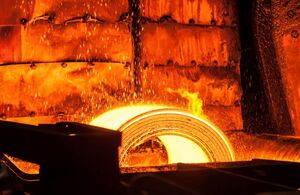TRA proposes increase to Category 1 steel imports quota
Due to a reduction in UK production of Category 1 steel, the TRA proposes that the quota on imports be varied and increased to a total of 2.9 million tonnes.

皇冠体育app Trade Remedies Authority (TRA) has today (9 August 2024) published聽聽to vary the tariff rate quota (TRQ) on imports of Category 1 steel products.
Changes in circumstance, including the聽recent closure of a blast furnace at Tata Steel UK鈥檚 Port Talbot works as part of a transition to an electric arc furnace, have impacted the UK鈥檚 domestic production of Category 1 steel. This聽has led to an聽increase in imports consistently exhausting part of the quota for Category 1 steel (hot rolled flat steel products) across four consecutive quarters. This in turn has driven up the cost of these products for the UK market.
To address this 鈥榗hange in circumstances鈥�, in February 2024 the TRA initiated a review of the TRQ on Category 1 steel, following an application from Tata and Kromat Trading Ltd.
As a result of the reduction in domestic production of Category 1 steel, the TRA has proposed that the measure be varied by duplicating Category 1 to form Categories 1A and 1B:
- 皇冠体育app quota for Category 1A, which would be accessible by parties looking to import the products for commercial applications, will be retained at current levels.
- 皇冠体育app quota for Category 1B, which would be accessible solely for downstream processing, will be set 聽89% higher than that of 1A.
- Taking Category 1A and Category 1B together, the total Category 1 quota will be approximately 2.9 million tonnes per year. 聽
皇冠体育app TRA has proposed that the Category 1B quota is also allocated on a global basis to allow companies to establish reliable supply chains for domestic processing, along with a cap in the range of 37-42% to ensure no single country鈥檚 exports dominate this new quota.
TRA Chief Executive Oliver Griffiths said:
鈥淥ur proposal today is designed to deal with the reduction in production of hot rolled flat steel at Port Talbot. 皇冠体育appse changes have resulted in higher imports and parts of the current quota being exhausted, creating uncertainty and driving up costs for steel users. We propose maintaining the current quota volumes for steel used for commercial applications and creating a new quota accessible for downstream processing.鈥�
皇冠体育app import allowance under Category 1A equates to just over 1 million tonnes annually; and under Category 1B, to around 1.9 million tonnes annually . If these limits were breached, importers would need to pay the 25% tariff.
A period of comment is now open and interested parties can comment on the Statement of Intended Final Determination through the聽聽by 19 August 2024. Please contact聽[email protected]聽if you have any difficulties using this service.
Notes to editors:
- 皇冠体育app聽TRA聽is the UK body that investigates whether trade remedy measures are needed to counter unfair import practices and unforeseen surges of imports.聽
- Trade remedy investigations were carried out by the EU Commission on the UK鈥檚 behalf until the UK left the EU. A number of EU trade remedy measures of interest to UK producers were carried across into UK law when the UK left the EU and the TRA has been reviewing each one to assess whether they are suitable for UK needs.聽
- Safeguard measures are one of three types of trade remedies 鈥� along with anti-dumping measures which counter goods being 鈥榙umped鈥� into countries at prices below their normal price in their country of origin and countervailing measures against countervailable subsidies 鈥� that are allowed under World Trade Organisation (WTO) rules.
- Safeguard measures are emergency actions responding to increased imports of particular products, which cause serious injury to the importing country鈥檚 domestic industry. 皇冠体育appy apply to all imports (with some exceptions), rather than being focused on imports from particular countries. 皇冠体育appy impose duties when imports exceed a level reflecting traditional trading patterns.
- Category 1 steel is commonly used as a raw material for other types of steel and makes up almost a third of all steel production globally.